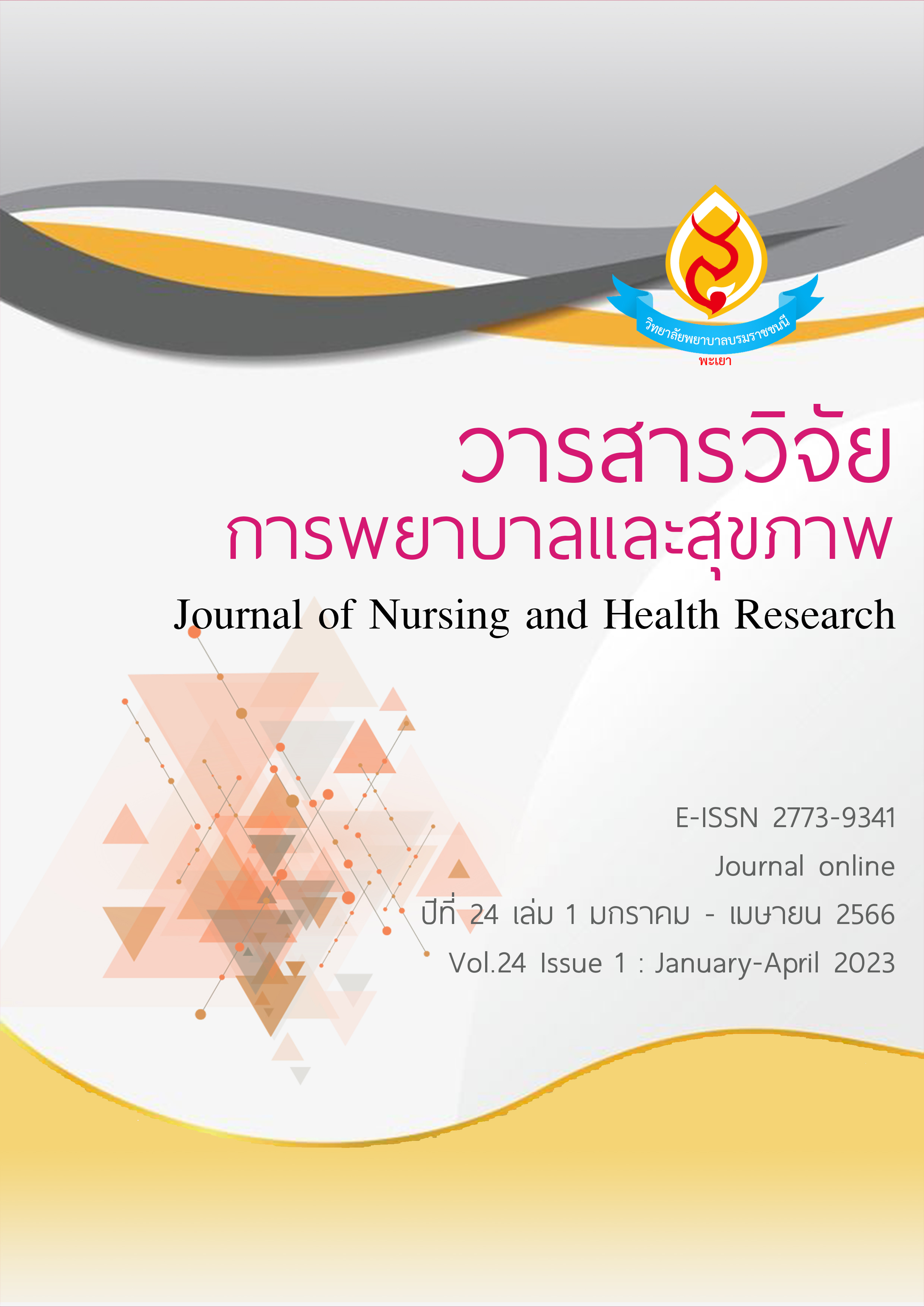ประสิทธิผลของโปรแกรมการให้ความรู้รายบุคคลต่อการปรับตัวด้านบทบาทการเป็นมารดาและ โอกาสเสี่ยงในการเกิดภาวะซึมเศร้าหลังคลอดของมารดาครรภ์แรก
คำสำคัญ:
โปรแกรมการให้ความรู้รายบุคคล, การปรับตัวด้านบทบาทการเป็นมารดา, ภาวะซึมเศร้าหลังคลอด, มารดาหลังคลอดครรภ์แรกบทคัดย่อ
มารดาครรภ์แรกที่ไม่สามารถปรับตัวในบทบาทการเป็นมารดาอาจทำให้ตนเองรู้สึกไร้ค่า ขาดความภาคภูมิใจ และมีโอกาสเกิดภาวะซึมเศร้าหลังคลอด การให้ความรู้รายบุคคลทำให้มารดาสามารถปรับตัวในบทบาทการเป็นมารดาจะลดโอกาสเสี่ยงต่อการเกิดภาวะซึมเศร้าหลังคลอดได้ การวิจัยกึ่งทดลองครั้งนี้มีวัตถุประสงค์เพื่อเปรียบเทียบคะแนนเฉลี่ยของการปรับตัวด้านบทบาทการเป็นมารดา และโอกาสเสี่ยงในการเกิดภาวะซึมเศร้าหลังคลอดของมารดาครรภ์แรก กลุ่มตัวอย่างคือมารดาครรภ์แรกในระยะตั้งครรภ์อายุครรภ์ 36–38 สัปดาห์ คัดเลือกตามเกณฑ์ที่กำหนดจำนวน 48 คน จากนั้นสุ่มกลุ่มตัวอย่างเข้ากลุ่มทดลองและกลุ่มควบคุม กลุ่มละ 24 คน โดยการสุ่มอย่างง่าย กลุ่มทดลองจะได้รับโปรแกรมการให้ความรู้เป็นรายบุคคลร่วมกับการให้ความรู้ตามปกติ กลุ่มควบคุมจะได้รับความรู้ตามปกติ เครื่องมือที่ใช้ในการรวบรวมข้อมูลประกอบด้วย แบบสอบถามข้อมูลส่วนบุคคล แบบประเมินการปรับตัวด้านบทบาทการเป็นมารดา มีค่าความตรงตามเนื้อหาเท่ากับ .80 และค่าความเชื่อมั่นเท่ากับ .79 และแบบประเมินโอกาสเสี่ยงของการเกิดภาวะซึมเศร้าหลังคลอด มีค่าความเชื่อมั่นเท่ากับ .84 วิเคราะห์ข้อมูลโดยใช้สถิติพรรณนา สถิติทดสอบไคสแควร์ และแมนวิทนีย์ ยู ผลการวิจัย พบว่า หลังการทดลองกลุ่มทดลองมีคะแนนเฉลี่ยของความสามารถในการปรับตัวด้านบทบาทการเป็นมารดามากกว่าในกลุ่มควบคุม และมีคะแนนเฉลี่ยของโอกาสเสี่ยงในการเกิดภาวะซึมเศร้าหลังคลอดน้อยกว่ากลุ่มควบคุมอย่างมีนัยสำคัญทางสถิติ (p<.001) ผลการศึกษาควรนำมาใช้ในการให้ความรู้รายบุคคลแก่มารดาครรภ์แรกเพื่อส่งเสริมให้สามารถปรับตัวด้านบทบาทการเป็นมารดาและลดโอกาสเสี่ยงในการเกิดภาวะซึมเศร้าหลังคลอด
เอกสารอ้างอิง
กุลธิดา หัตถพาณิชกุล, วรรณา พาหุวัฒนกร, เยาวลักษณ์ เสรีเสถียร และดิฐกานต์ บริบูรณ์หิรัญสาร. (2555). ผลของโปรแกรมการสอนร่วมกับการมีส่วนร่วมของสามีต่อการปรับตัว ด้านบทบาทการเป็นมารดาของมารดาวัยรุ่นในระยะหลังคลอด. วารสารการพยาบาล, 27(4), 84-94.
จารุรินทร์ ปิตานุพงศ์และกมลรัตน์ วัชราภรณ์. (2548). ความชุกและปัจจัยที่เกี่ยวข้องกับการเกิดโรคซึมเศร้าหลังคลอดในโรงพยาบาลสงขลานครินทร์. สงขลานครินทร์เวชสาร, 23(4), 249-254.
เติมศักดิ์ สุขวิบูลย์. (2552). ข้อคำนึงในการสร้างเครื่องมือประเภทมาตราประมาณค่า (rating scale) เพื่อการวิจัย. เข้าถึงได้จาก http://www.ms.src.ku.ac.th2schedule/Files /2553/Oct/1217086.doc.
ทองภาพ นาร่อง, พิริยา ศุภศรี และสุพิศ ศิริอรุณรัตน์. (2557). ผลของโปรแกรมการส่งเสริมบทบาทมารดาต่อการรับรู้การสนับสนุนของครอบครัว และความสำเร็จในการดำรงบทบาทมารดา. วารสารคณะพยาบาลศาสตร์ มหาวิทยาลัยบูรภา, 22(1), 15-26.
พรพรรณ พุ่มประยูร, กรรณิการ์ กันธะรักษา และบังอร ศุภวิฑิตพัฒนา. (2559). ผลของการเตรียมสตรีตั้งครรภ์แรกต่อความสำเร็จในการดำรงบทบาทมารดา. พยาบาลสาร, 43(4), 33-43.
มุฑิตา คำบ่อ, พรรณพิไล ศรีอาภรณ์ และจีราวรรณ คำเหลือ. (2563). ผลของโปรแกรมการป้องกันภาวะซึมเศร้าหลังคลอดต่อภาวะซึมเศร้าหลังคลอดในมารดาวัยรุ่น. วารสารการพยาบาลและการดูแลสุขภาพ, 38(1), 147-156.
วันชัย กิตติโชติวัฒน์. (2561). ความชุกและปัจจัยที่เกี่ยวข้องกับภาวะซึมเศร้าหลังคลอดของโรงพยาบาลแก่งคอย จังหวัดสระบุรี. วารสารกรมการแพทย์, 43(5), 25-130.
วราภรณ์ ปฏิสังข์. (2560). ผลของโปรแกรมการให้ความรู้และการสนับสนุนของครอบครัวต่ออารมณ์เศร้าในมารดาหลังคลอด. (วิทยานิพนธ์ปริญญาพยาบาลศาสตรมหาบัณฑิต สาขาการผดุงครรภ์ชั้นสูง). ชลบุรี: มหาวิทยาลัยบูรพา.
เสาวลักษณ์ เสียงนัน. (2561). ผลของโปรแกรมการส่งเสริมความมีคุณค่าในตนเองในการปฏิบัติบทบาทการเป็นมารดาต่อภาวะซึมเศร้าหลังคลอดในมารดาวันรุ่น.(วิทยานิพนธ์หลักสูตรพยาบาลศาสตรมหาบัณฑิต สาขาวิชาการพยาบาลเวชปฏิบัติชุมชน). กรุงเทพฯ: มหาวิทยาลัยธรรมศาสตร์.
อักษราณัฐ ภักดีสมัย, พรรณพิไล ศรีอาภรณ์ และปิยะนุช ชูโต. (2560). ปัจจัยทำนายภาวะซึมเศร้าหลังคลอดในผู้ที่เป็นมารดาครั้งแรก. พยาบาลสาร, 44(3),19-29.
อัยย์ชาร์ สุขเกษม, กัญญาณัฐ สิทธิกา, ฐิติพร แสงพลอย และนลินี สิทธิบุญมา. (2561). ภาวะซึมเศร้าหลังคลอด: บทบาทสำคัญของพยาบาล. เชียงรายเวชสาร, 10(2), 217-228.
Beck, C. T. (2001). Predictor of postpartum depression: an update. Nursing Research, 50, 75-85.
Bobak, I. M. & Jensen, M.D. (1993). Family dynamics after childbirth. In maternity & gynecology care: The Nurse & family (3rd ed.). St. Louis, MO: Mosby.
Coopersmith, S. (1981). The antecedent of self-esteem (2nd ed.). California: Consulting Psychologist Press.
Mercer, R. T. (1995). Becoming a mother. New York: Springer.
Osman, H., Saliba, M., Chaaya, M., & Naasan, G. (2014). Interventions to reduce postpartum stress in first-time mothers: a randomized-controlled trial. BMC Women's Health, 14(1), 14-125. doi: 10.1186/1472-6874-14-125
Perry, S. E., Hockenberry, M. J., Lowdermilk, D. L., & Wilson, D. (Eds). (2014). Maternal child nursing care (5th ed.). Canada: Elsevier.
Pridham, K. F., & Chang, A. S. (1992). Transition to being the mother of a new infant in the first 3 months: Maternal problem solving and self-appraisals. Journal of Advanced Nursing, 17(2), 204-216
Roy, S. C., & Andrews, H. A. (1999). The Roy’s adaptation model (2nd ed.). Stamford: Appleton & Lange.
Shimpuku, Y., Iida, M., Hirose, N., Tada, K., Tsuji, T., Kubota, A., … Horiuchi, S. (2022). Prenatal education program decreases postpartum depression and increases maternal confidence: a longitudinal quasi-experimental study in urban Japan. Women and Birth, 35(5), e456–e463. doi: 10.1016/j.wombi.2021.11.004
Sockol, L. E., Epperson, C. N., & Barber, J. P. (2014). The relationship between maternal attitudes and symptoms of depression and anxiety among pregnant and postpartum first-time mothers. Archives of Women’s Mental Health, 17(3), 199-212. doi: 10.1007/s00737-014-0424-9
Stewart, J., Watts, K., Hughes, A. J., Slade, P., & Spiby, H. (2022). The importance of face to face, group antenatal education classes for first time mothers: A qualitative study. Midwifery, 109, 103295. doi: 10.1016/j.midw.2022.103295
World Health Organization. (2017). Depression and other common mental disorders: global health estimates. Retrieved from https://apps.who.int/iris/bitstream/handle/10665/254610/WHO-MSD-MER-2017.2-eng.pdf
ดาวน์โหลด
เผยแพร่แล้ว
รูปแบบการอ้างอิง
ฉบับ
ประเภทบทความ
สัญญาอนุญาต
ลิขสิทธิ์ (c) 2023 วารสารวิจัยการพยาบาลและสุขภาพ

อนุญาตภายใต้เงื่อนไข Creative Commons Attribution-NonCommercial-NoDerivatives 4.0 International License.



